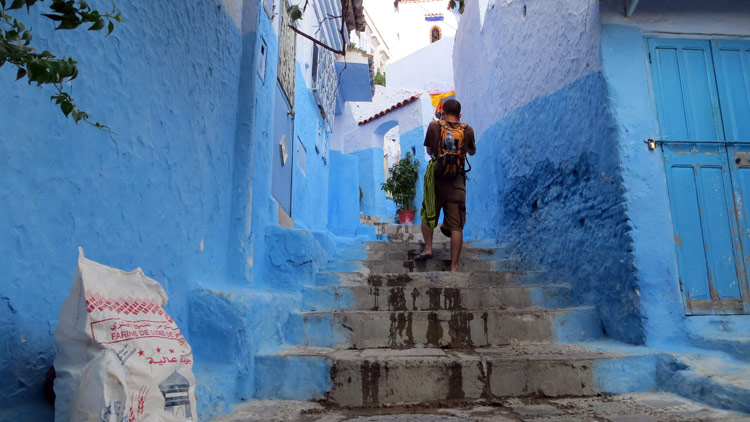
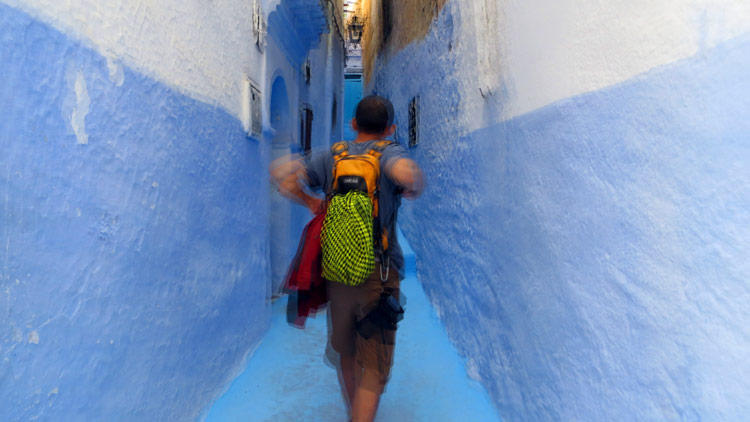

C H R O N I C L E S . O F . T H I S . F L O A T I N G . L I F E
As such, having been invited to visit by a young woman native to Meknes (whom I had met at the Merzouga sand dunes), a visit to Volubilis is compulsory as it is roughly 30 km away. Getting to the site was no trivial task as Meknes is not the most tourist friendly city in terms of transport facility. After wasting half the morning wandering around this bustling city sorting out contradictory transport information — and trying my best to negotiate assistance in broken French and Spanish — I recoursed to hiring a taxi to and from. This is contrary to my preferred mode of exploration as it necessarily precludes direct interaction with the local public.
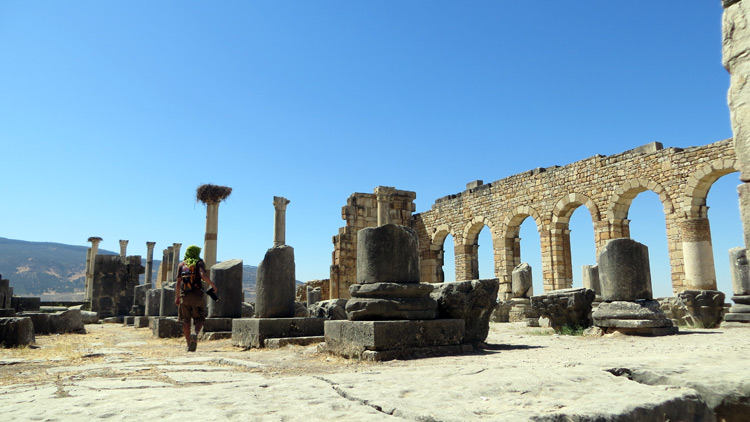
Admittedly, I have an unusual fascination with ruins; but, particularly predisposed to the grandeur of architectural/archeological ruins. Majestic ruins always evokes a feeling of awe, wonder, sense of timelessness, and yet, concomitantly, ever a present reminder of the pressing impermanence of all things. Ancient Volubilis is no different. This sprawling ruin of a former municipium had once been part of an independent Mauritanian kingdom of various indigenous Berber tribes before the Romans marched in and staked it as their western-most frontier.
What was known as Walili to the locals became Latinized as Volubilis, replete with triumphal arches, Roman roads, basilica and all. Much has change in the sweep of two thousand years, and yet the remnants of this Roman colonial town outpost still remains scatter across a vast sloping field overlooking the dried out pastoral planes of summer. Having occupied the region for roughly two and a half centuries (40-270 CE), the Romans eventually retreated back east, unable to fend off constant pressure from the Berbers trying to reclaim their land.
When the Arabs arrived in the latter 8th century to herald the beginning of Islamic North Africa, the Romans had been gone 500 years , yet Volubilis remained inhabited; with the locals speaking still a dialect of Latin. Indeed, at its peak evidence suggest that many different ethnic groups lived side by side here. In fact, Morocco’s varied history is readily reflected in the faces of the population today; the population is discernable as a motley history of who conquered whom on the faces of those one meets.
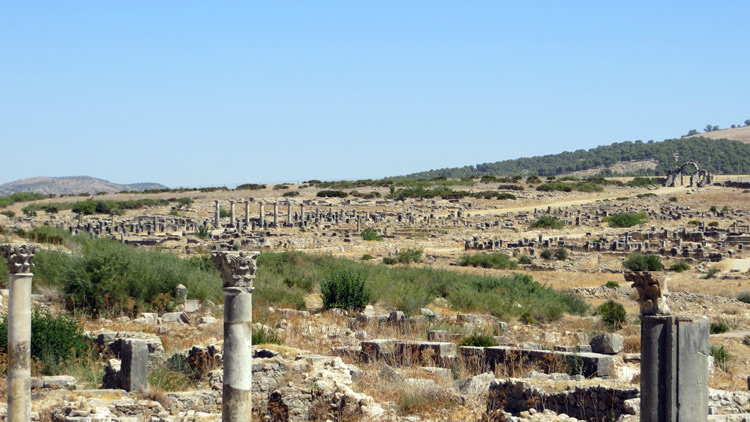
Volubilis was finally abandoned probably sometime in the latter 18th century. Perhaps the great Lisbon quake of 1755 contributed to it’s final destruction as much of the structures and masonry were demolished to build the palaces of Moulay Ismail in Meknes. Had it not been for this plundering, Volubilis would survive today as one of the best Roman ruins anywhere. As it remains, it is but a mere semblance, a faded semblance of an once-glorious city.
It’s wondrous to walk pass the columns, roads, and inlaid mosaics still… all echoing footsteps of the pass trodden by succeeding civilizations that have supplanted each other. Time hastens the passing centuries and firmaments roll; one conquering civilization displaces another in due time. This is the course of human history as laid out in stone on the vast plane stretching beneath Jbel Zerhoun mountain.
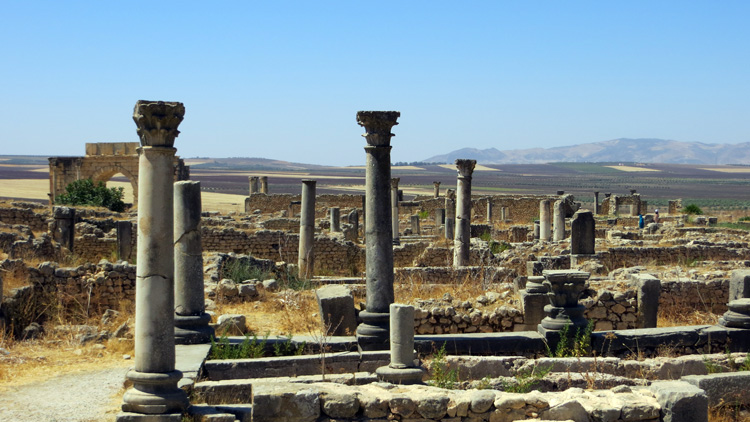
The road winds along the ochre cliffsides of Berber country between Marrakech and Ouarzate. This countryside landscape is dotted with sparse vegetation contrasting the barren sloping rocks. Somewhere, hours ahead down the quiet road, lies the vast expanses of the forbiddingly hot Saharan sands. Again and again the switchbacks exchange one parched vista with another.
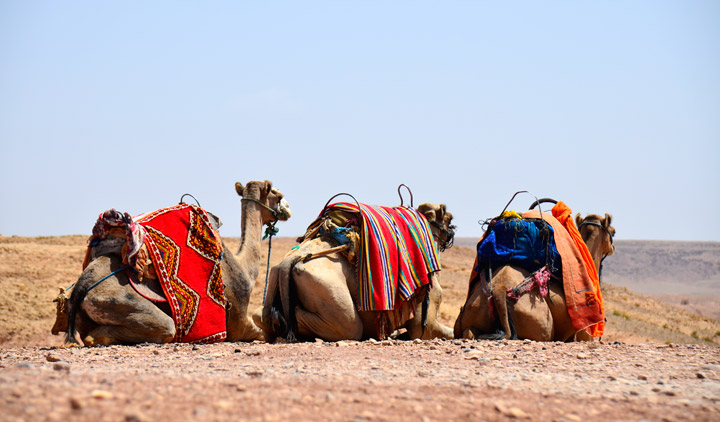
Unlike Marrakech, the heat here is dry and searing, forcing me to resort to dousing a scarf and occasionally dabbing my skin to cool off. It’s obvious that the locals and some other visitors are much more adapted to this extreme climate than myself. The members of this caravan chatter incessantly in a dull drone, their articulations are indistinguishably drowned out by the blaring Arabic music. As the only lone traveller in the group, at times the silence is poignant and at times I’m consumed by the random musings of my internal dialogue, lost in the remoteness of this forgotten landscape.
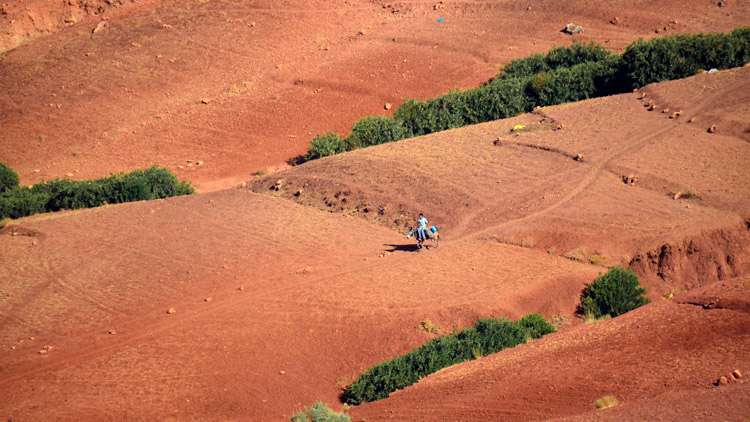
Sweat drips off my chin, the shirt on my back is saturated. Yet no amount of water seems to slake my growing thirst. Intermittently, the intense heat lulls me to a lethargic doze; until either a bump in the road or some sharp note jolt me from stupor.
The landscape grows ever forlorn. We’ve long passed the Berber towns, from here out only sparse villages hug the low hillsides. Now and then a lone local will stroll pass in his long flowing gown, leisurely stepping towards the slanting sun. In the far distance trails, a few women folk stand chatting in their shimmering robes; or possibly a merchant astride a donkey (too far to discern) descening a hill. Regardless, the heat is stultifying to all, numbing the mind to the edge of delirium.
By now I’m not sure how many times I have passed through Miami International. Again, I’m awaiting a connecting flight…Madrid this time, en route to Marrakech. Looking out on the tarmac through the rain splattered terminal panes, a certain sense of inertia surfaced (or was is ennui due to the inclement weather?) — a sort of “neither here nor there” sense. This floating life has now ventured over much land, sea, and air; for all the unknown adventures yet another trip brings, a billowing sense of unease accompanies it.
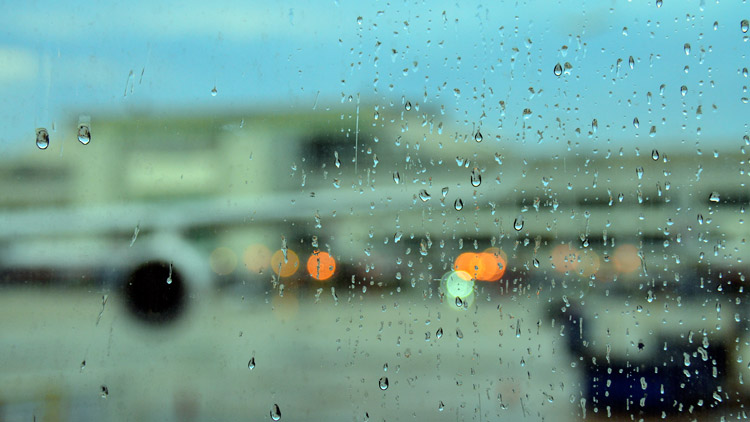
I have left my make-shift home drifting with the tides unattended, off to chase the Saharan sun without prior planning. It seems the commitment of yet another years confines to work promoted the latest urging. Neither here more there can lasting contentment be found, but meeting with a new culture will stimulate invigorate senses to brave the year ahead.
The plane barrels east, the dawn brightens with each passing minute. Soon I’ll be wandering lost in the alleyways of the ancient Berbers.